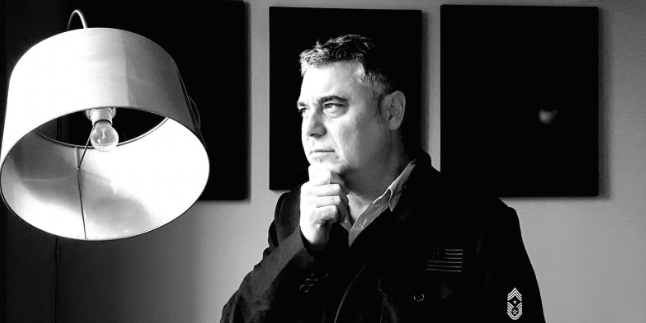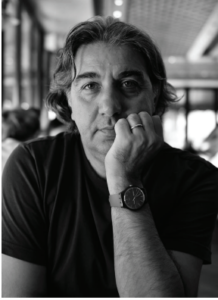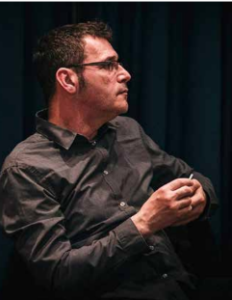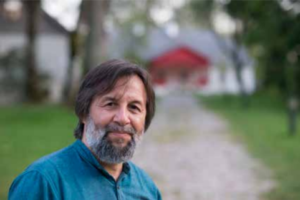Alek Popov (born Sofia, Bulgaria, 1966) is a leading Bulgarian writer, author of four novels, several collections of short stories and essays, scripts and plays. His hugely
successful first novel, the comic satire Mission London, based on his experiences as diplomat, has been translated in seventeen languages. The essay we are publishing is
closely related to the novel Mission Turan. The core theme of this novel is the “quest for roots”, around which issues of corruption, demographic crisis, fears of migration and
lack of democracy revolve. The novel takes an ironic approach to the phenomenon of rising nationalism in Eastern Europe and tries to see it in the broader context of the
search for identity.
In the not-too-distant year 2008, a strange delegation was greeted with solemn state honors at the Alexander the Great International Airport in Skopje. The delegation was headed by the prince of Hunza people, Gazanfar Ali Khan, who bears the title of Mir, his wife, Princess Rani Attica, and others. The Hunza people inhabit several hard-to-reach valleys in northern Pakistan, at the foot of the Himalayas. The prince and his men are considered descendants of the soldiers of the legendary Alexander the Great, who reached these places twenty-three centuries ago. The visit is the culmination of a process that began as early as 2005 in the context of the efforts by the former Yugoslav Republic to assert its national identity, building on the heritage of ancient Macedonians, which is claimed by neighboring Greece as well. However, here we will not explore the nature of this absurd dispute, but rather focus on mythology, and in particular on the “myths of the beginning” and its speculative uses in the present.
The King of the Hunza, dressed in a traditional costume wearing an exotic feather hat, has made it clear to the media that he is incredibly proud to be in the land of his ancestors. Journalists are delighted. Newspapers are rife with headlines of “Macedonians Return to Macedonia.” The king and his entourage were received at the highest level. The government plans to give them a vast area where a residence and cultural center will be built. Organizers of the event point out that this will give a serious impetus to the tourism industry.
The news of this unusual visit and its accompanying euphoria, of course, is not taken unequivocally. Even in Macedonia, this exotic event has become a source for ironic comments. In Bulgaria, where everything related to the neighbors is considered very seriously, this news also aroused mostly ridicule, but also certain jealousy. The following comments could also be read on the Internet:
We BULGARIANS are heirs of the Huns!!! The root of the word Hunza comes from Huns, and that’s us!!! *** they don’t have a gram of blood connection with the Huns, to our great happiness!!!
Excuse me, but I also want to build a Royal Palace in the Holy Land of my great-great-great-grandparents, who are also Hunu-Proto-Bulgarians. I want to correct you that the Great Attila-Khan of the Hunuro-Bulgarians of the Great Proto-Bulgarian house DULO created his Hunuro-Bulgarian State in the 4th century …
And so on.
The origin and ancestry of the Bulgarians has always been a theme that excited our society since the dawn of the National Revival until today. Who are we, and where do we come from? The issue still raises heated debate and feeds all sorts of historical speculation, often tainted by ideological biases and, more recently, by business interests.
At the same time, when our Macedonian neighbors welcomed Mir Gazanfar Ali Khan, an eastward expedition from Bulgaria trailed along the footsteps of alleged Bulgarian migrations: Tajikistan, Uzbekistan, Afghanistan. As a result of this trip, the television series “Bulgarians – Motherland” was produced and broadcast on BTV. The authors of the film claim that the birthplace of the Bulgarians is the ancient Bactria, also called Balkhara, covering territories in northeast Afghanistan and Pakistan. Among other “traces,” there is also a rock relief, reminiscent of the famous stone horseman from the town of Madara in Northern Bulgaria. What is more, it turns out that the find in northern Afghanistan is also called “madara” or “modar”. The similarities do not stop there: the scientists are said to have discovered localities that bear the names Shumen and Varna as the present-day towns in Bulgaria, to have written down a legend for the hero Hodja Bolgar, and to have identified more than 800 words of similar sound and meaning between the local Farsi and the Bulgarian language. Even today, they claim, in the region, beautiful girls were said to be “beautiful as Bulgarian women.”
In the next years to come, BTV broadcast another documentary series, “The Bulgarians”, a large-scale television project in 10 episodes. The film’s crew traveled over 30,000 kilometers: from Bulgaria to Siberia, Chuvashia, Tatarstan, Altai, Tianshan and Pamir, all the way to the borders with Mongolia and China, in search of scattered traces of the great ancient people. In the meantime, dozens of titles with similar content appeared on the book market, and perhaps hundreds of websites and blogs related to this topic. What provokes this interest and what psychological mechanism is behind it? Is it a new phenomenon or something that has already happened before, albeit in a different form?
In Bulgarian historiography, several theories exist about the origins of our ancient ancestors, which, because of the lack of sufficient categorical evidence and, in particular, because of the time distance of the period under consideration, are condemned to be coexisting. Attempts to answer this fundamental question ate back to the 18th century and scholars from a wide variety of fields have tried to solve it. “As a result, a number of hypotheses have been created, some of which amaze with their quirkiness and perseverance in defending them”, ironically noted on this occasion Prof. Vasil Guzelev, one of the leading Bulgarian historians.
Here is the list of the basic theories about the origin of the Bulgarians:
- The Turan theory has appeared in the 18th century and still remains the most popular. According to it, the Proto-Bulgarians are an independent ancient Turkic Ogur-tongue nation, formed in the middle of the second century in Central Asia by mixing remains of the Eastern Hun ethnic group and Sarmatian tribes. The visual symbol of this theory is the restored skull of a medieval nobleman – the Ichurguboil Mostich – whose features betrays a clearly Turkic origin.
- The Hun Theory gained popularity at the beginning of the 20th century. According to it, Bulgarians belong to the group of Hun tribes that appeared on the Ural River in the first half of the 2nd century. Some insist that they are related to the Hunnu people who created in the 2nd century BC. a state union north of China. Particularly flattering for national self-esteem is the hypothesis that the Chinese built the Great Wall of China to protect themselves from the raids of the ancient Bulgarians.
- The Iranian or Indo-European Theory became popular since 1989. To a certain extent, it reflects the inferiority complex of the alleged Turkic origins of the Proto-Bulgarians, which originated in Bulgarian culture at the end of the 19th century as a result of nationalist propaganda in the neighboring rival states. According this theory, the Proto-Bulgarians are no longer the small nomad horde lost among the Slavic sea, but a highly developed Aryan civilization dominating numerically and culturally over the occupied population.
- The Autochthonous Theory holds that the Proto-Bulgarians have nothing to do with any aliens from Asia, but are an old local people, closely related in origin to the ancient Balkan Thracian, proto-Thracian and Middle Eastern populations.
The purpose of this brief is not to analyze the theories listed above, but rather to recreate the feeling of existential insecurity in the face of so many different hypotheses. But the roots of this uncertainty are not really in the past, but in the present. The Proto-Bulgarian studies witnessed one of their most active periods in the interval between the two world wars. For Bulgaria, this was a time marked by national catastrophe, humiliation, acute social clashes, political crises, and the shadow of rising totalitarian regimes in Europe. Against this gloomy background, the glorious past radiates a particularly alluring splendor. Ancient greatness seems to compensate for the present tribulations and promise future victories. The return to the ancestral values, to the covenant of blood and tribe, is seen as a cure for nihilism and ideological turmoil that has led to today’s decline. This situation was not unique to Bulgarian society only. Similar were the sentiments in other parts of Europe, where the brutal effects of war were also painfully felt. The social, cultural, and ideological divisions made the post-war nations especially vulnerable to mythology related to the roots, race, and heroics of prehistory. The ideology of Nazism ultimately derived from this emotional base.
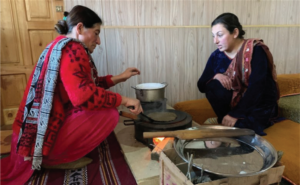
It has been almost a century since then, and today we are facing again a similar phenomenon. It is unlikely to meet a Bulgarian who does not have his own opinion on the question of origin and ancestry shaped by his personal ideological preferences. And there are plenty of options! Where are the roots of our current insecurity? What makes us seek solace and support in antiquity? Who are we? Where we come from? As if the simple fact that we are here and now is not enough. Maybe it has something to do with the feeling that we are once again deceived by history? With the fear of disappearing and dissolving in the global world. With the acute feeling of loneliness in this impersonal consumer environment. Yes, today’s world is different from what it used to be in the 1930s. However, the symptoms of anxiety are similar.

